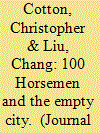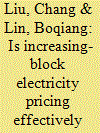|
|
|
Sort Order |
|
|
|
Items / Page
|
|
|
|
|
|
|
| Srl | Item |
| 1 |
ID:
103720


|
|
|
|
|
| Publication |
2011.
|
| Summary/Abstract |
We present game theoretic models of two of the most famous military bluffs from history. These include the legend of Li Guang and his 100 horsemen (144 BC), and the legend of Zhuge Liang and the Empty City (228 AD). In both legends, the military commander faces a much stronger opposing army, but instead of ordering his men to retreat, he orders them to act in a manner consistent with baiting the enemy into an ambush. The stronger opposing army, uncertain whether it is facing a weak opponent or an ambush, then decides to flee and avoid battle. Military scholars refer to both stories to illustrate the importance of deception in warfare, often highlighting the creativity of the generals' strategies. We model both situations as signaling games in which the opponent is uncertain whether the general is weak (i.e. has few soldiers) or strong (i.e. has a larger army waiting to ambush his opponent if they engage in combat). We then derive the unique Perfect Bayesian Equilibrium of the games. When the probability of a weak general is high enough, the equilibrium involves mixed strategies, with weak generals sometimes fleeing and sometimes bluffing about their strength. The equilibrium always involves the generals and their opponents acting as they did in the historical examples with at least a positive probability. When the probability of a weak general is lower (which is reasonable given the reputations of Li Guang and Zhuge Liang), then the unique equilibrium always involves bluffing by the general and retreat by his opponent.
|
|
|
|
|
|
|
|
|
|
|
|
|
|
|
|
| 2 |
ID:
177464


|
|
|
|
|
| Summary/Abstract |
Subsidies and policy support are critical for the development of renewable energy industries such as solar photovoltaics (PV). One of the most important policy instruments for supporting renewable energy development is the feed-in tariff (FIT), which is intended to have a significant, facilitating impact on the steady development of the PV industry. The questions are how strong market reactions are to FIT policies and what forms of policies are more effective. To investigate these questions, this paper uses an event study approach and pays special attention to the responses of the capital market. The empirical results show that the stock returns of listed PV companies in China respond significantly to FIT policies. The capital market responses of these policy shocks differ significantly over time and across companies. Manufacturing companies and companies receiving large subsidies are more sensitive to policy shocks. Given the importance of equity financing to the renewable energy industry, policymakers should take into account the potential uncertainties in the sector that are caused by policy changes.
|
|
|
|
|
|
|
|
|
|
|
|
|
|
|
|
| 3 |
ID:
171483


|
|
|
|
|
| Summary/Abstract |
China is the largest emerging economy and electricity consumer in the world. Despite the rapid increase in residential electricity consumption, retail residential electricity price in China remained at a low level, leading to large amounts of cross-subsidies. To address this issue, the increasing-block electricity pricing (IBP) system was established in the residential sector nationwide in 2012. This paper depicts the detailed implementation of the IBP in Shanghai and Shenzhen, which are typical Chinese cities. Overall, the IBP motivates residential electricity saving to some extent. However, 15.55% of the respondents still do not know about the IBP. Most respondents have limited knowledge about the contents of the IBP. 58% of the respondents were unaware that retail residential electricity prices were subsidized by the government. Furthermore, binary response models were applied to analyze the influencing factors of respondents' electricity saving feedback on the IBP. The analysis indicates that if households are large, apply time-of-use (TOU) pricing, purchase energy-efficient appliances, have adequate knowledge of electricity saving and IBP contents, or understand the situation of electricity cross-subsidy, they are more likely to be influenced by the IBP to save electricity. The government should enhance public's awareness about IBP, optimize the pricing of each block and guide the residents to understand the existence of electricity subsidy.
|
|
|
|
|
|
|
|
|
|
|
|
|
|
|
|
| 4 |
ID:
192364


|
|
|
|
|
| Summary/Abstract |
The critical role of income in individual health is not only reflected in the direct effect of income but also derived from the relative income levels within cohorts. This study first constructs relative deprivation indicators to measure the relative income levels of rural households by taking village-level households as the reference group. Using the data from the four waves of the China Health and Retirement Longitudinal Study (2011–2018), we apply a panel event study approach to detect the impact of relative deprivation on the health status of rural middle-aged and older adults. The estimation results show the significantly negative and persistent effects of deterioration in relative deprivation on the physical and mental health outcomes of these adults. In rural China, the impact of relative deprivation on individual health shows significant age and wealth differences, but no significant gender differences are observed. Meanwhile, local collective culture plays important roles. The findings have important implications for the government to improve public health policies and promote healthy aging.
|
|
|
|
|
|
|
|
|
|
|
|
|
|
|
|
| 5 |
ID:
177433


|
|
|
|
|
| Summary/Abstract |
Historically, coal has been a primary input driving China's economic growth. However, it has impacted air quality significantly and negatively in the past decades. Among all efforts and measures, the Residential Coal Switch Policy (RCSP), implemented in the 1990s, is considered the most fundamental but challenging pathway toward reducing pollution. This study offers a comprehensive policy panorama to policymakers and researchers, explaining the dynamic evolution of the RCSP under varying objectives and constraints. Based on 66 policy documents issued by the central government during the years 2012–2019, the study reviews the RCSP systematically and presents three development stages. We create an index to measure policy-enforcement intensity at each stage and find that policymakers have become more sophisticated in identifying specific target groups, increasing the use of target-management tools over time. Results indicate that most of the Beijing-Tianjin-Hebei and surrounding areas have achieved and exceeded established targets. Command and control, financial support, competitive funds, and residential willingness to pay for air quality are the primary factors related to achievement. Future challenges are also presented, including the unsustainability of subsidies, the absence of building-reconstruction investment, and the scarcity of clean energy.
|
|
|
|
|
|
|
|
|
|
|
|
|
|
|
|
| 6 |
ID:
150474


|
|
|
|
|
| Summary/Abstract |
This paper focuses on the application of panel models for identification and analysis of influence of oil price volatility on statistical properties of country risk ratings which stem from uncertainty of macroeconomic fluctuations. Firstly, two statistical properties of country risk ratings, volatility clustering and asymmetrical revision were identified in a theoretical framework based on Cruces (2006). Secondly, considering the oil price volatility, numerical experiments were conducted based on extended models to test and verify specific properties of country risk ratings in selected oil-exporting countries. Empirical results suggest that properties of country risk remain comparatively steady despite oil price volatility. It is also found that the oil price volatility can obviously exaggerate the country risk volatility, as it happened during 2007–2009. Country clustering based on the properties of country risk ratings shows that the selected countries maintain a significant clustering tendency. These features are of great importance for estimating risk exposure of international trade and investments in oil export during extreme situations.
|
|
|
|
|
|
|
|
|
|
|
|
|
|
|
|
| 7 |
ID:
150367


|
|
|
|
|
| Summary/Abstract |
Studies have indicated that there exists a relatively stable and positive correlation between electricity consumption and economic growth and there should not be a large deviation between them. However, the deviation between electricity consumption and economic growth in China during the Asian Financial Crisis and Global Economic Crisis sparks intense debates. We attempt to explain the deviation from the perspective of inventory investment adjustment in the business cycle using the SVAR model in this paper. The results show that the effects of inventory investment adjustment shock and electricity consumption structure shock on the deviation are positive but tend to be negative for electricity efficiency shock. The results of historical decomposition of these shocks also show that the inventory investment adjustment shock is the main factor that influences the deviation during the Global Economic Crisis. Economic fluctuation in the short term can not change the economic development pattern and the characteristics of electricity demand. Once the economy returns to stable growth, the deviation between electricity consumption and economic growth will shrink and disappear soon.
|
|
|
|
|
|
|
|
|
|
|
|
|
|
|
|
|
|
|
|
|